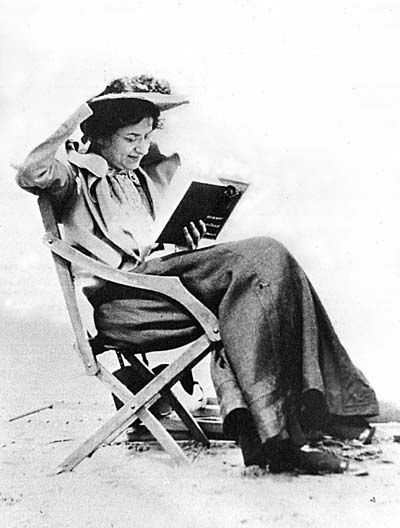 Eleanor Farjeon, poet, children’s writer, and popularly remembered as author of the hymn ‘Morning Has Broken’, became one of Time and Tide’s regular staff writers in May 1922. Most of her contributions appeared under a pseudonym, ‘Chimaera’, including ‘The Weekly Crowd’, a topical verse feature which ran for nearly ten years. Farjeon’s writing for Time and Tide is marked by her strong socialist and pacifist convictions and injected a radical poetics to the paper that sometimes ran counter to its editorial line.
Eleanor Farjeon, poet, children’s writer, and popularly remembered as author of the hymn ‘Morning Has Broken’, became one of Time and Tide’s regular staff writers in May 1922. Most of her contributions appeared under a pseudonym, ‘Chimaera’, including ‘The Weekly Crowd’, a topical verse feature which ran for nearly ten years. Farjeon’s writing for Time and Tide is marked by her strong socialist and pacifist convictions and injected a radical poetics to the paper that sometimes ran counter to its editorial line.
Farjeon was born in 1881 into a very talented literary and artistic family. Her mother, Margaret Jane, was second child of the celebrated American actor Joseph Jefferson; her father, Benjamin Leopold, was a successful popular novelist. Her two younger brothers Joe and Herbert also became writers, while her eldest brother, Harry, taught music at the Royal Academy. Farjeon received no formal education, but she was given free run of her father’s library of 8,000 books which filled every room of the Farjeons’ house in Hampstead, London. Their home was also a meeting-place for famous actors, writers, and musicians, a creative atmosphere which encouraged Farjeon’s literary ambitions. During the 1910s, in London and in Sussex, she formed important friendships with other writers of her generation including Viola Meynell, D. H. Lawrence, and Edward Thomas.
Farjeon’s first professional breakthrough was in 1916 when London publisher Duckworth brought out the illustrated Nursery Rhymes of London Town: poems by Farjeon which had originally appeared anonymously in Punch magazine. This led to a contract with the socialist newspaper the Daily Herald to provide a daily verse under the pseudonym ‘Tom Fool’, providing Farjeon with her first steady income. Farjeon’s next literary work of note was a collection of tales in the pastoral mode, Martin Pippin in the Apple Orchard (1921). The book was favourably reviewed, including in Time and Tide, establishing her critical reputation as a writer.
‘The Weekly Crowd. By Chimaera’ appeared in Time and Tide from 19 May 1922 to 30 May 1931. Its weekly summing-up of the news in verse became a staple part of Time and Tide’s early identity and extended the magazine’s reach to a socialist as well as feminist readership. Her pacifism shapes early poems responding to the Irish Civil War (1922-23) and the following opening stanza of a ‘Weekly Crowd’ poem demonstrates her importance as an anti-war poet. Appearing in Time and Tide’s issue of 4 August 1922, it was written following the No More War demonstrations held in London and around the world on Saturday 29 July, the anniversary of the outbreak of the First World War:
No more War!
No more War!
That was the cry their banners bore,
That was the message they sent forth,
East and West and South and North,
Who on Saturday did fare
On the World’s face everywhere –
Pilgrims, with their Slogan plain:
‘Not again, oh not again,
Tear our children as you tore
Us! For men are stricken sore,
And earth has suffered at the core –
No more War,
No more, no more!’
In October 1922 Farjeon began contributing poems under the pseudonym ‘Merry Andrew’ to the Independent Labour Party organ, the New Leader, and she became increasingly militant on the issue of labour in her contributions to Time and Tide. The non-appearance of Farjeon’s ‘Weekly Crowd’ in an abridged issue of Time and Tide produced during the General Strike of May 1926 represents a striking withdrawal of her services to the paper (which supported the Government) in solidarity with the industrial working class. Farjeon’s radicalism could be expressed more openly in poems she contributed to the British Worker, the official bulletin of the Trade Union Council published daily from the Daily Herald offices for the duration of the strike. However, Farjeon’s ‘Weekly Crowd’ poems left a radical imprint on Time and Tide and aligned her with other socialists among the magazine’s contributor base such as Leonora Eyles and Mary Agnes Hamilton.
During the 1930s Farjeon reached the height of her popularity as a children’s author and was less dependent on journalism for an income. In Time and Tide, her ‘Weekly Crowd’ poems were succeeded in June 1931 by a monthly feature ‘The Broadsheet’ which ran until June 1934. Over the course of her career Farjeon published more than eighty books. The Little Bookroom (1955), Farjeon’s own selection of her best short stories for children, won her the Carnegie Medal, the UK’s oldest and most prestigious book award for children’s writing. One of the stories collected here, ‘The Little Dressmaker’, was first published in Time and Tide in December 1929.
Farjeon never married and had no children of her own, but from 1920 cohabited openly with George Earle, a schoolteacher, when it was still unconventional for unmarried couples to live together, and after his death in 1949 entered a new relationship with an actor, Denys Blakelock. Farjeon died at her home in Hampstead on 5 June 1965. Her service to children’s literature is commemorated in the annual Eleanor Farjeon Award founded by the Children’s Book Circle.
By Dr Catherine Clay
Sources:
Barratt, David, ‘Eleanor Farjeon’, Dictionary of Literary Biography, Vol. 160: British Children’s Writers, 1914-1960, ed. by Donald R. Hettinga and Gary D. Shmidt (London: Gale Research, 1996), pp. 88-101.
Clay, Catherine, Time and Tide; The Feminist and Cultural Politics of a Modern Magazine (EUP, 2018)